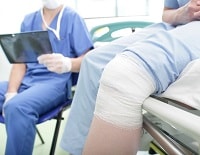
The knee is largest joint in the body and, because of its complexity, it is also very susceptible to injury, especially in car accidents. Car accident knee injuries are serious. They can prevent you from being able to go to work, walk, or even feel like getting out of bed in the morning.
One of the most common ways people can get a serious knee injury is during car accidents. The force from colliding with another vehicle can do some serious damage to the human body. Your knee may strike the car’s dashboard or simply bend the wrong way during the crash.
Symptoms of serious knee injuries that can occur after a car accident include:
Fractures
High impact automobile collisions can leave drivers and passengers with broken or fractured bones. The most common broken bone in the knee is the patella, also known as the knee cap. Additionally, fractures and breaks are common at the ends of the femur and tibia.
Dislocations
Rather than breaking, your bone may simply dislocate. The force from a crash can cause the patella to slip out of place or force the femur and tibia out of alignment.
Tendon Tears
Tendons attach muscle to bone. When the tendons in your knee tear, there may be bruising and difficulty walking because it feels like your knee is going to buckle or give way.
Additionally, your patella may move if the tendon attaching it in place tears. In the knee, the quadriceps and patellar tendons are likely to stretch and tear during a car accident.
Ligament Injuries
Ligaments hold joints together by attaching bone to bone. Knee ligament injuries have symptoms such as:
Partial tears may heal on their own, while more serious tears will require surgery. There are four types of ligament injuries in the knee that can occur a car accident:
Anterior Cruciate Ligament (ACL) Injury: People often associate this injury with sports, as it can be career ending. The ACL is a major knee ligament that connects the thigh bone to the shin bone and can tear with a sudden change in direction.
Posterior Cruciate Ligament (PCL) Injury: The PCL is another major knee ligament that connects the thigh bone to the shin bone. It is most likely to tear from a blow to the front of the knee while the knee is bent.
Lateral Collateral Ligament (LCL) Injury: This minor knee ligament connects the thigh bone to the fibula. A blow to the inside of the knee can tear the LCL.
Medial Collateral Ligament (MCL): This minor knee ligament connects the thigh bone to the shin bone. A blow to the outside of the knee can tear the MCL.
Torn Meniscus
Knees have two menisci. These are pieces of cartilage that act as a cushion between the shinbone and thighbone. The meniscus can tear during a car accident, especially if your knee twists pivots or sustains a laceration. Torn meniscus injuries cause pain, swelling, stiffness, and may result in trouble completely extending your knee.
Depending on the type of injury and its severity, you may conservative treatments such as rest, ice, elevation, and pain relievers, or you may need expensive surgeries.
In addition to paying for surgery, you may need to pay for physical therapy or ER visits.
A serious knee injury can also prevent you from being able to go to work, leaving you wondering how you are possibly going to pay for all this.
If your car accident was the result of another person’s negligence, you may be eligible to recover compensation.
The attorneys at Goldstein & Bashner can help.
Contact us today to discuss your options for recovering compensation: 516-222-4000.